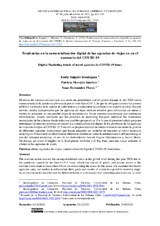Mostrar el registro sencillo del ítem
Tendencias en la comercialización digital de las agencias de viajes en en el escenario del COVID-19
| dc.contributor.author | Salgado Domínguez, Emily | |
| dc.contributor.author | Morejón Sánchez, Patricia | |
| dc.contributor.author | Hernández Flores, Yoan | |
| dc.date.accessioned | 2022-01-13T08:41:03Z | |
| dc.date.available | 2022-01-13T08:41:03Z | |
| dc.date.issued | 2021 | |
| dc.identifier.issn | 2530-7134 | |
| dc.identifier.uri | http://hdl.handle.net/10396/22321 | |
| dc.description.abstract | El sector del turismo atravesó por una crisis sin precedentes a nivel global durante el año 2020 como consecuencia de la pandemia provocada por el virus Sars-CoV-2, lo que ha obligado a todos los actores públicos y privados de la cadena de valor turística a concentrar sus esfuerzos en superar la crisis. En este sentido, resulta indispensable que las agencias de viajes realicen estudios para reformular sus metas y modos de actuación en una posible etapa de recuperación. En un entorno caracterizado por tendencias diferenciadas, resulta necesario que los procesos de marketing busquen satisfacer las verdaderas necesidades de los clientes desde todas sus posibles perspectivas. Por lo que el presente trabajo propone determinar las mejores prácticas en cuanto a la comercialización digital de los productos de las agencias de viajes en tiempos de COVID-19. Para ello se propuso realizar un estudio tomando en cuenta la gestión de diferentes agencias tradicionales que hayan adaptado sus modelos de negocios al nuevo escenario tecnológico. Finalmente se identificaron diferentes tendencias como la automatización del marketing, el uso del inbound marketing, el uso de las herramientas Search Engine Optimization y Social Media Marketing, así como el empleo de la Inteligencia Artificial y el Big Data para una mejor atención al cliente en las agencias de viajes. | es_ES |
| dc.description.abstract | The tourism sector crossed for an unprecedented crisis at the global level during the year 2020 due to the pandemic caused by the Sars-CoV-2 virus, which has forced all public and private actors in the tourism value chain to focus their efforts on overcoming the crisis. In this sense, it is essential that travel agencies carry out studies to reformulate their goals and modes of action in a possible recovery stage. In an environment characterized by different trend, it is necessary that marketing processes use to meet the real needs of customers from all possible perspectives. Therefore, this investigation proposes to determinate the best practices regarding the digital marketing of products in travel agencies in COVID-19 times. To this end, it was proposed to conduct a study taking into account the management of different traditional agencies that have adapted their business models to the new technological scenario. Finally, different trends were identified such as marketing automation, the use of inbound marketing, Search Engine Optimization and Social Media Marketing tools, artificial intelligence and the big data to improve the customer service in travel agencies. | es_ES |
| dc.format.mimetype | application/pdf | es_ES |
| dc.language.iso | spa | es_ES |
| dc.publisher | UCOPress | es_ES |
| dc.rights | https://creativecommons.org/licenses/by-nc/4.0/ | es_ES |
| dc.source | Revista Internacional de Turismo, Empresa y Territorio (RITUREM) 5(2), 131-145 (2021) | es_ES |
| dc.subject | Agencias de viajes | es_ES |
| dc.subject | Comercialización digital | es_ES |
| dc.subject | COVID-19 | es_ES |
| dc.subject | Tendencias | es_ES |
| dc.subject | Travel Agencies | es_ES |
| dc.subject | Trends | es_ES |
| dc.title | Tendencias en la comercialización digital de las agencias de viajes en en el escenario del COVID-19 | es_ES |
| dc.title.alternative | Digital Marketing trends of travel agencies in COVID-19 times | es_ES |
| dc.type | info:eu-repo/semantics/article | es_ES |
| dc.relation.publisherversion | http://www.uco.es/ucopress/ojs/index.php/riturem/index | es_ES |
| dc.rights.accessRights | info:eu-repo/semantics/openAccess | es_ES |

